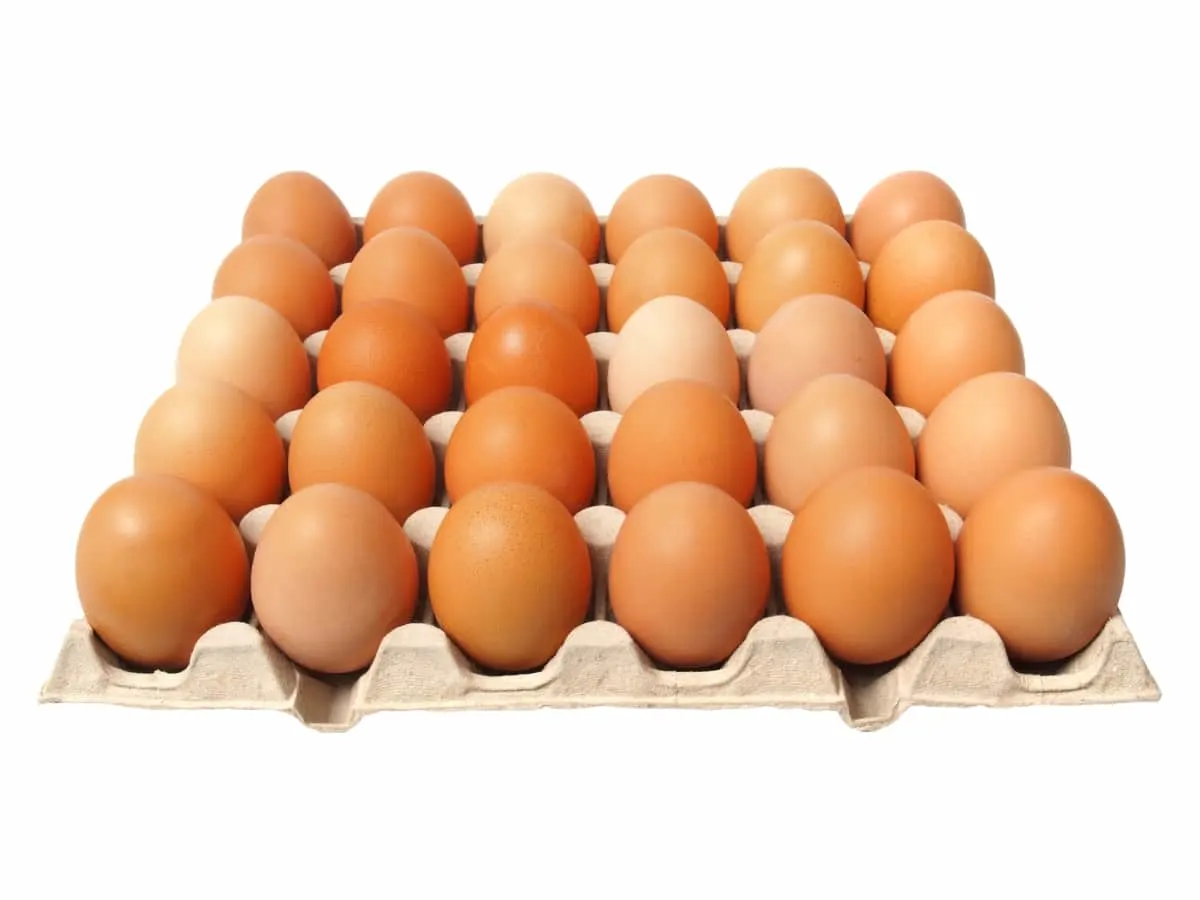Feeding eggs to your Labrador can help improve their health and muscle growth. However, there is a common misconception about the safety of feeding eggs to dogs. So, can Labradors eat eggs without any harm?
Labradors can eat eggs. They are excellent sources of protein, vitamins, and minerals that can benefit your dog’s overall health. However, you should serve cooked eggs, as raw eggs can pose a risk of salmonella and decrease the absorption of biotin.
Adding eggs to your Labrador’s diet as a healthy option is possible, but it’s essential to consider the frequency, quantity, nutrition levels, benefits, and risks. If you’re like me and you carefully plan your dog’s meals, this guide will be helpful for you.
Let’s dive in and discuss nutrition!

Nutrition Benefits of Eggs for Dogs
Eggs are a nutritional powerhouse containing various essential nutrients that can benefit your Labrador’s health. They are packed with proteins, vitamins, and minerals that contribute to a well-rounded diet for your furry friend.
Here’s a detailed table showcasing the nutrient composition of an egg and the ideal levels of each nutrient required for a healthy Labrador per day:
| Nutrient | Quantity in an Egg | Ideal Daily Intake for a Lab |
|---|---|---|
| Protein | 6g | 56g – 70g (depending on weight) |
| Fat | 5g | 14g – 24g |
| Vitamin A | 75 μg | 380 μg – 950 μg |
| Vitamin D | 1.0 μg | 8.5 μg – 14.0 μg |
| Vitamin E | 0.5 mg | 6.0 mg – 10.0 mg |
| Vitamin K | 0.3 μg | 100 μg – 200 μg |
| B Vitamins (B1, B2, B3, B6, B12, etc.) | Various | Various |
| Folate | 24 μg | 5.0 mg – 10.0 mg |
| Calcium | 26 mg | 1,000 mg – 1,800 mg |
| Phosphorus | 95 mg | 700 mg – 2,000 mg |
| Potassium | 63 mg | 600 mg – 800 mg |
| Selenium | 15μg | 75 μg – 90 μg |
Note that these values are approximate and can vary based on factors like the size of the egg, the size of your Labrador, or your dog’s specific nutritional requirements.
Nevertheless, it’s evident that eggs act as critical sources of nutrients to boost the basic dietary needs of Labradors. According to the American Kennel Club, eggs act as a catalyst in improving the skin coat of a dog.
Can Labradors Eat Eggs?
Good news! Your Labrador can indeed eat eggs. Eggs provide the necessary vitamins and minerals required for dogs. However, in most cases, eggs act as supplements and are only a part of the main meal.
Eggs contain high levels of protein, which helps support muscle development and maintenance, as well as healthy coat and immune system function.
Also, eggs are packed with essential vitamins and minerals such as vitamins A and B, iron, calcium, and fatty acids. These nutrients play a crucial role in maintaining your dog’s strong and healthy body.
However, I’d suggest being aware of the safety levels and ideal quantity of eggs for your Labrador. As a general rule, 2-3 cooked eggs per week is sufficient for an adult Lab.
Overfeeding eggs can lead to health issues like pancreatitis due to their high amount of fatty acids. Eggs are high in cholesterol and can affect the overall physical balance when they’re fed in excess.

When it comes to feeding eggs to your Labrador, both the egg whites and yolks are safe, but make sure to avoid feeding them raw eggs. Raw egg whites can sometimes cause biotin deficiency in dogs, while raw egg yolks can contain harmful bacteria like salmonella.
Thus, you should serve your Labrador with cooked eggs instead, which can be boiled, scrambled, or poached. Cooking eggs will eliminate the risk of biotin deficiency and reduce the risk of bacterial infections.
Here’s the TL;DR version to get a quick glance at raw vs. cooked eggs:
| Raw Eggs | Cooked Eggs | |
|---|---|---|
| Safety | Risky, can cause biotin deficiency and bacterial infections | Safe, biotin and bacteria risk eliminated |
| Nutrients | High in protein, vitamins, and minerals | Retains most nutrient content after cooking |
| Quantity | Not recommended | 2-3 cooked eggs per week |
Are Eggs Good or Bad for a Dog’s Health?
If you ask someone like me who has decades of experience with varied dog breeds, I’d say eggs are good to add flavor and supplement their regular diet. They’re bad because my dogs get quickly addicted to eggs and keep asking for more.
Benefits of Eggs for Labradors:
- Easily digestible protein: Eggs are an excellent source of protein, which is essential for your Labrador’s growth, muscle development, and overall health.
- Rich in essential amino acids: Amino acids are the building blocks of protein, and eggs provide all the essential amino acids your Labrador needs for optimal health.
- High-quality vitamins and minerals: Eggs are a natural source of vitamins and minerals, including Vitamin A, Vitamin D, Vitamin B12, riboflavin, selenium, and choline, which contribute to your Labrador’s overall wellness.
- Boost immune system: The nutrients in eggs can help support your Labrador’s immune system, keeping them healthy and strong.
- Improves skin and coat health: The healthy fats and vitamins found in eggs can promote a shiny, healthy coat and improve skin health for your Labrador.
While eggs have many nutritional benefits, there are some potential risks you should be aware of before feeding them to your Labrador.
Risks of Eggs for Labradors:
- Raw egg whites: Feeding raw egg whites can lead to biotin deficiency in dogs, as the protein avidin in raw egg whites binds with biotin, making it unavailable for absorption. This can negatively impact your Labrador’s skin, coat, and overall health.
- Salmonella risk: Raw eggs can carry salmonella bacteria, which could potentially lead to infection in your Labrador.
- Allergic reactions: Some dogs may be allergic to eggs, and feeding them eggs could cause an allergic reaction. Symptoms include itching, redness, swelling, and gastrointestinal issues.
As an excellent protein source, I tend to feed eggs along with other greens, and my dogs enjoy the flavor. Sometimes, when the food looks colorful, my Labrador gets excited and is never picky again.
Isn’t that a great advantage?

How To Safely Introduce Eggs to Your Labrador’s Diet
Introducing eggs to your Labrador’s diet can provide valuable nutrients, but there are some considerations to keep in mind. Feeding your Labrador eggs in the right quantity and monitoring their health is essential for ensuring a safe, balanced diet.
To begin, consider your Labrador’s age when determining egg consumption. Generally, younger dogs can consume more eggs than older dogs as their metabolisms are faster.
As a Labrador owner, you should monitor your Labrador’s health after giving eggs. Observe your dog’s energy levels, reactions, and digestive system within 3-6 hours after consumption to ensure they tolerate eggs well.
Let me tell you what happened when I first gave eggs to my Labradors:
Most of them digested eggs very well, but one of them began vomiting and developing rashes all over his body for two days. Upon taking him to a vet, I learned that he had an egg allergy.
“Ensuring your Labrador is tolerant and isn’t allergic to eggs is the first step!”
Labradors have a strong digestive system that can handle different types of food, including eggs. According to Shaw Labrador Rescue, the digestion of a Labrador gets disrupted only when they consume the wrong food or are suffering from parasitic or bacterial infection.
Having said that, Labradors also demand regular checks on their digestion processes. Sometimes, they forage outside and then consume something at home, which turns indigestible, and they become allergic for a reason unknown. At least, it has often puzzled me at my dog shelter.
If you’d like to stay on the safer side, you should learn the signs.
Signs of an allergic reaction may include itching, swelling, and difficulty breathing. Weakness, seizures, or lethargy may indicate toxicity. In such cases, seek veterinary assistance immediately.
Not all human foods are safe for Labradors. If you’d like to know about safe human foods for dogs, watch the video below:
How to Feed Eggs to Your Labrador
Feeding eggs to your Labrador can be a great treat and a valuable addition to their diet. The primary approach to feeding eggs to your dog is to make a note of their existing health condition, egg form proposed, and egg tolerance level.
Always feed your Labrador with cooked eggs rather than raw. Raw eggs can contain harmful bacteria that could lead to fever or bacterial infection. According to the Centers for Disease Control and Prevention, raw egg is prone to contamination and is never safe in this form.
The US Food and Drug Administration also warns us not to consume or purchase eggs that look or smell unusual. As soon as you buy eggs for your dog, pay attention to proper storage and disposal.
Cooking the eggs eliminates this risk and also makes them easier for your dog to digest. Scrambled eggs are a popular choice, but keep it simple and avoid adding salt, pepper, or other seasonings that could upset your dog’s stomach.
When introducing eggs to puppies, start with just a small amount and gradually increase the portion as they grow and adjust to the new food.
By following these guidelines, you can safely incorporate eggs into your dog’s diet and provide a tasty and nutritious treat for your furry friend.

How Many Eggs Can a Labrador Eat?
Sometimes, we get overexcited to feeding our dog too much food or too many treats, causing the little one to become overweight or experience gastrointestinal upsets.
Are you wondering how many eggs you can feed your Labrador to keep him big and strong?
When determining the right amount of eggs for your Labrador’s diet, a good rule of thumb is to consider their weight and age. The following table provides a general guideline for the egg quantity based on your Labrador’s age:
| Age of Labrador | 1/2 to 1 whole egg every other day |
|---|---|
| 2-4 months | 1/4 to 1/2 of an egg every other day |
| 4-12 months | 1/2 to 1 full egg every other day |
| 12 months+ | 1 full egg, 2-3 times per week |
Always consider eggs as supplements for your Labrador. Don’t make it the main part of their diet, as there are other safe foods for Labradors.
How Can You Tell If a Labrador Has a Bad Reaction to Eggs?
While eggs can be healthy for many dogs, some may not tolerate them well. Keep an eye out for the following signs, which could suggest your Labrador is experiencing an adverse reaction:
- Vomiting or diarrhea: If your dog begins to vomit or have diarrhea shortly after consuming eggs, this may be a sign that their body is reacting negatively to the food.
- Skin irritation or itching: Notice if your Labrador starts scratching excessively or has red, irritated skin after eating eggs. This could indicate an allergic reaction.
- Swelling: Check for any swelling around your dog’s face, particularly the mouth, lips, or eyes, as it could also indicate a hypersensitivity.
- Difficulty breathing: If your Labrador is experiencing difficulty breathing, wheezing, or coughing, it may be a sign that needs immediate attention.
Staying vigilant and attentive to your dog’s needs is highly recommended for better parenting.
Alternatives to Eggs for Labradors
Having spoken enough about the good and bad for Labradors, it’s time to see if you can explore alternatives and fix their dietary needs. Want to learn more?
Here’s a list of some substitutes you can consider for your Labrador:
- Cheese: Low-fat options like mozzarella or cottage cheese can be tasty treats.
- Lean meats: Beef, chicken, or turkey are great sources of protein for growth and development.
- Fish: Salmon and tuna are packed with Omega-3 fatty acids that benefit heart health.
- Healthy fats: Seeds, organic yogurt, and salmon provide healthy fats to support the immune system and ensure healthy skin and coat.
- Fruits and vegetables: Combine dog-friendly options like carrots, blueberries, and apples for a nutrient-rich treat, but avoid grapes, which can be toxic to dogs.
- Peanut butter: A classic dog treat, opt for unsalted and natural versions without added sugar, sweeteners such as xylitol, or salt.
- Pumpkin: High in fiber and magnesium, pumpkin can help support digestion and overall health.
- Sweet potato: Rich in vitamins and minerals, cooked sweet potatoes can be a nutritious addition to your Labrador’s diet.
Always choose treats and food options that are appropriate for your dog’s size and weight. Organic and natural ingredients are always better for your furry friend’s overall health.
FAQs
How many eggs can a Labrador eat daily?
The number of eggs a Labrador can eat daily depends on their size, health, and activity level. However, you should feed eggs in moderation due to their high fat content. If you want to feed your Labrador Retriever eggs, do so sparingly as a treat or occasional meal replacement, limiting it to only two or three times per week.
Can Labradors eat raw eggs?
Labradors should not eat raw eggs. Feeding eggs to Labradors can be healthy, but there are risks to consider. The main concern is salmonella contamination, so eggs should be cooked thoroughly. Raw eggs can also cause biotin absorption issues, and some Labradors may be allergic to eggs.
Can Labradors eat eggshells?
Feeding eggshells to Labradors is generally safe and can even provide some nutritional benefits. Eggshells are a good source of calcium, which is important for maintaining strong bones and teeth. However, ensure the eggshells are thoroughly cleaned and ground into a fine powder before adding them to your dog’s food. Large pieces of eggshell can be a choking hazard and may cause digestive issues.

